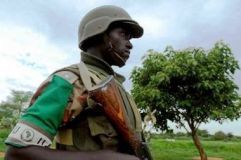AU says plans to increase troop strength in Darfur
Sept 24, 2006 (KHARTOUM) — The African Union plans to send more troops into Sudan to reinforce its extended Darfur peacekeeping mission, an AU spokesman said on Sunday.

The move came as international pressure on Sudan rises to allow a robust force of 20,000 U.N. troops into Darfur to replace the current 7,000 poorly funded African Union troops tasked with monitoring a battered ceasefire.
“It will be a matter of battalions. I cannot specify how many battalions we are going to bring, but we are going to increase the number of troops,” AU spokesman Noureddine Mezni said. A battalion is usually composed of 600 to 800 soldiers.
He said a troop increase was needed to handle additional responsibilities since the signing of the Darfur Peace Agreement in May between the government and one rebel faction.
An estimated 200,000 people have died in Darfur since violence flared in 2003, and 2.5 million have been displaced in the fighting between government forces, rebels and militias.
The African Union’s mandate in Darfur had been set to expire on Sept. 30 and the pan-African body had said it could not continue beyond October because it was out of money and needed more equipment such as helicopters.
With aid experts predicting a new humanitarian catastrophe in Darfur if African troops withdrew, the AU agreed last week to extend its mission until Dec. 31, with logistical and material support from the United Nations and funding from Arab states.
Mezni said more troops were also needed to bolster the operation in the arid region the size of France.
“We have additional tasks. It is important to increase the number. We are working on that,” he said, adding if approved troops could begin deploying within a matter of weeks.
The African Union had sought six more battalions in an operating plan approved in June. But donors who gathered in Brussels in July cautioned against that increase and a proposal was made to limit it to two battalions, an AU report said.
The soldiers would come from countries already contributing troops in Darfur — Nigeria, Rwanda, South Africa and Senegal.
U.N. GEARS UP
Meanwhile, efforts were to continue on Monday at the United Nations to gear up for a possible mission transfer, and Sudanese President Omar Hassan al-Bashir said he would impose a travel ban on U.S. officials that would confine them to Khartoum.
Bashir, in his first news conference since returning from a trip to New York, said the ban was in response to similar restrictions placed on Sudanese officials in the United States.
“Any American official who comes to Sudan, we will stamp his passport for only 25 km (16 miles) from the presidential palace,” Bashir told journalists. “And even if they apologise and lift theirs, we will not lift ours.”
He said the decision could be reconsidered after ties improve. Bashir’s announcement was met with spontaneous cheers of “God is Greatest” by Sudanese journalists.
More than 140 countries interested in contributing troops and police to a U.N. peacekeeping force in Darfur are expected to attend a meeting convened by the U.N. department of peacekeeping operations in New York.
The Sudanese government has refused to allow U.N. forces into Darfur, calling it a Western ploy to recolonise Sudan.
A U.N. force is seen as better able than the AU troops to aggressively enforce a tattered 2004 ceasefire and a peace deal signed in May that a top U.N. envoy has described as comatose.
“Time is running out. The violence in Darfur is not subsiding, it is getting worse,” U.S. Secretary of State Condoleezza Rice said at a special meeting on Darfur on Friday.
Egypt’s U.N. ambassador, Maged Abdelaziz, told Reuters at the New York meeting everyone agreed on a U.N. force, but with the consent of Sudan’s government, which has rejected it.
“The issue is not to get the U.N. force in. The issue here is how to strategise for the next three months while the African Union force is still in place,” he said.
Leaders from the 15-member AU Peace and Security Council are set to meet again in November to review the situation in Darfur.
(Reuters)
